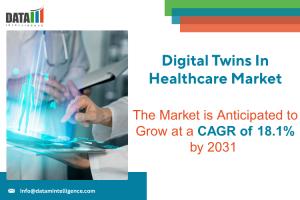Digital Twins In Healthcare Market Accelerates Toward $27.5 Billion By 2031 | DataM Intelligence
The Digital Twins in Healthcare Market reached USD 1.55 billion in 2023 and is projected to expand at a CAGR of 18.1%, reaching USD 27.5 billion by 2031.
Market Overview
Digital twins in healthcare create virtual replicas of physical patients, devices, or care environments, using real-time data streams to simulate, predict, and optimize clinical decisions. By integrating sensor data, medical imaging, and electronic health record inputs, digital twins enable proactive risk assessment, personalized treatment regimens, and streamlined facility management across the continuum of care.
Get Detailed Premium Sample PDF: https://www.datamintelligence.com/download-sample/digital-twins-in-healthcare-market
Market Drivers
-> Artificial Intelligence & Machine Learning Integration
-> IoT-Enabled Real-Time Monitoring
-> Cloud Computing Scalability
-> Regulatory Encouragement
-> Growing Demand for Personalized Medicine
Market Dynamics: Drivers & Restraints
Increasing technological advancements in AI, ML, IoT, and cloud computing are propelling digital twins in healthcare forward. AI and ML facilitate the creation of accurate, predictive models that illuminate disease trajectories and optimize treatment outcomes. IoT devices capture real-time biometric data, heart rate, glucose levels, respiratory metrics feeding continuous inputs into dynamic digital replicas.
Simultaneously, cloud infrastructures store and process vast datasets, ensuring that care teams across locations can access and scale these solutions. Augmented reality (AR) and virtual reality (VR) overlay these models onto surgical planning and medical training, offering immersive, high-fidelity simulations. While these innovations enhance efficiency and patient outcomes, challenges such as data privacy regulations and high initial investment costs can slow adoption in resource-constrained settings.
For instance, in May 2024, Twin Health expanded its digital twin AI platform originally designed to achieve remission in type 2 diabetes patients to address obesity and weight management. The new Healthy Weight solution pairs advanced AI algorithms with compassionate virtual coaching, helping members lose weight without reliance on costly medications. By reinvesting savings from reduced GLP-1 usage and fewer clinical interventions, the program underscores how digital twins can deliver both clinical and economic value.
Market Segment Analysis
The Digital Twins in Healthcare market is comprehensively segmented to address diverse industry needs:
In Product Type, software segment is expected to dominate the digital twins in healthcare market share, where as in application diagnostics segment is the fastest-growing segment in digital twins in healthcare market share.
By Product Type
• Software
• Services
• Hardware
By Application
• Diagnostics
• Treatment Planning
• Patient Monitoring
• Drug Discovery & Development
• Healthcare Facility Management
By Technology
• Artificial Intelligence (AI)
• Machine Learning (ML)
• Internet of Things (IoT)
• Augmented Reality (AR)
• Virtual Reality (VR)
By End User
• Hospitals & Clinics
• Pharmaceutical & Biotechnology Companies
• Academic & Research Institutes
• Diagnostic Centers
Market Geographical Share
North America commands a significant share of the digital twins in healthcare market, thanks to its advanced medical infrastructure, high digital maturity, and substantial R&D investment. U.S. hospitals and research institutions lead early adoption of AI-driven simulations, while Canadian healthcare systems pilot interoperable twin platforms for chronic disease management. Robust reimbursement frameworks and government grants further bolster market growth across the region.
Competitive Landscape
Major players driving innovation in digital twin solutions include:
• Siemens Healthineers
• GE Healthcare
• Philips Healthcare
• Dassault Systèmes
• Microsoft Corporation
• IBM Corporation
• Oracle Corporation
• Twin Health
• Medtronic
• Hitachi, Ltd.
Emerging Players
Agile startups are carving out niches with specialized offerings:
• Qure.ai
• BioSymetrics
• Ansys
• Virtonomy
Key Developments
May 2024: Ontrak Inc. launched its Mental Health Digital Twin (MHDT) technology, combining empathetic care with data-driven insights to personalize mental health interventions.
February 2024: Unlearn secured a US$ 50 million Series C led by Altimeter Capital, aiming to eliminate trial-and-error medicine through advanced AI and robust R&D.
Looking For Full Report? Get It Here: https://www.datamintelligence.com/buy-now-page?report=digital-twins-in-healthcare-market
Related Reports:
Healthcare Cybersecurity Market Size 2024-2031
Healthcare Automation Tools Market Size 2024-2031
Sai Kumar
DataM Intelligence 4market Research LLP
+1 877-441-4866
sai.k@datamintelligence.com
Visit us on social media:
LinkedIn
X
Legal Disclaimer:
EIN Presswire provides this news content "as is" without warranty of any kind. We do not accept any responsibility or liability for the accuracy, content, images, videos, licenses, completeness, legality, or reliability of the information contained in this article. If you have any complaints or copyright issues related to this article, kindly contact the author above.
Tampa Florida based Krewe of Europa to appear in the Tarrytown NY Halloween Parade
Key Housing Announces August Featured Listing for Bakersfield Short-term Housing
Hands-On Diagnostics Announces Annual Symposium to Help Physical Therapists Improve Patient Outcomes
Więcej ważnych informacji
 Jedynka Newserii
Jedynka Newserii

 Jedynka Newserii
Jedynka Newserii

Konsument

Grupa nowych biednych emerytów stale się powiększa. Ich świadczenie jest znacznie poniżej minimalnej emerytury
Przybywa osób, które z powodu zbyt krótkiego czasu opłacania składek pobierają emeryturę niższą od minimalnej. Tak zwanych nowych biednych emerytów jest w Polsce ok. 430 tys., a zdecydowaną większość grupy stanowią kobiety – wskazują badania ekspertów Instytutu Pracy i Spraw Socjalnych. W ich przypadku krótszy okres składkowy zwykle wynika z konieczności opieki nad dziećmi lub innymi osobami w rodzinie. Wśród innych powodów, wymienianych zarówno przez panie, jak i panów, są także praca za granicą lub na czarno oraz zły stan zdrowia.
Media i PR
M. Wawrykiewicz (PO): Postępowanie z art. 7 przeciw Węgrom pokazało iluzoryczność tej sankcji. Unia wywiera naciski poprzez negocjacje nowego budżetu

Przykład Węgier pokazał, że procedura z artykułu 7 traktatu o UE o łamanie praworządności nie ma mocy prawnej z powodu braku większości, nie mówiąc o jednomyślności wśród pozostałych państw członkowskich. Negocjacje nowego budżetu UE to dobry pretekst do zmiany sposobu części finansowania z pominięciem rządu centralnego. Czerwcowy marsz Pride w Budapeszcie pokazał, że część społeczeństwa, głównie stolica, jest przeciwna rządom Viktora Orbána, ale i na prowincji świadomość konsekwencji działań Fideszu staje się coraz większa przed przyszłorocznymi wyborami.
Firma
Blockchain zmienia rynek pracy i edukacji. Poszukiwane są osoby posiadające wiedzę z różnych dziedzin

Zapotrzebowanie na specjalistów od technologii blockchain dynamicznie rośnie – nie tylko w obszarze IT, ale również w administracji, finansach czy logistyce. Coraz więcej uczelni wprowadza programy związane z rozproszonymi rejestrami, które wyposażają studentów w umiejętności odpowiadające wymogom rynku.
Partner serwisu
Szkolenia

Akademia Newserii
Akademia Newserii to projekt, w ramach którego najlepsi polscy dziennikarze biznesowi, giełdowi oraz lifestylowi, a także szkoleniowcy z wieloletnim doświadczeniem dzielą się swoją wiedzą nt. pracy z mediami.


![Nestlé w Polsce podsumowuje wpływ na krajową gospodarkę. Firma wygenerowała 0,6 proc. polskiego PKB [DEPESZA]](https://www.newseria.pl/files/1097841585/fabryka-nesquik_1,w_85,r_png,_small.png)






.gif)

 |
| |
| |
|